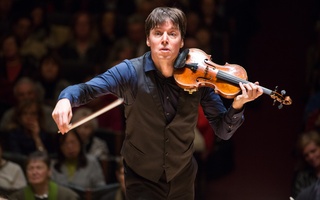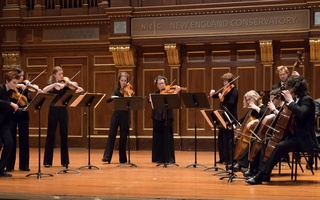{shortcode-ee01741e2f06ffac5cdfec308ea3d3f34281614d}
The Harvard-Radcliffe Orchestra delivered an impressive concert on Saturday. The program included Richard Wagner’s “Der Fliegende Höllander,” John Adams’ “Saxophone Concerto,” and Alberto Ginastera’s “Four Dances” from “Estancia.” The great variation offered by each piece made for an exciting listening experience, sampling music from three different centuries. Every moment of this wonderful concert was engaging.
Cellist and assistant conductor Sasha G. Scolnik-Brower ’17 conducted the opening piece, the overture to “Der Fliegende Höllander.” Intense from the start, “The Flying Dutchman” began with the bold main theme structured in the horns and low brass and given substance by the running strings beneath. This powerful melody was restated throughout the overture, which finally culminated in an unexpectedly soft finale. Though “Der Fliegende Höllander” did not quite achieve the level of precision of the ensuing pieces, the performance was well-executed nonetheless.
For the orchestra’s next selection, conductor Federico Cortese took over the baton to deliver the Boston-area premiere of Adams’ “Saxophone Concerto.” The featured saxophonist, Jake Tilton ’19, gave a performance that was awe-inspiring in musicality and endurance. The orchestra and saxophonist worked together like a well-written novel: While Tilton provided the plot, the orchestra determined its setting. The result was an otherworldly cacophony with a strong jazz influence that navigated changing keys and tempos and especially complex rhythms. The complexity of the Adams piece was in pleasing contrast to the strings, which provided the only percussion with their pizzicato sections. Although the orchestra and saxophonist played beautifully, it was the crisp, pregnant silences that really made this piece successful. Following the conclusion of the concerto, Cortese expressed his pleasure at Tilton’s astonishing performance. Audience members were equally impressed, giving Tilton and the orchestra a long standing ovation.
HRO concluded their concert with “Four Dances” from Argentinian composer Alberto Ginastera’s “Estancia.” For this selection, the percussion section was back in full force. The unity of the mallets and zealous tambourine technique stood out in particular, adding to the dance-like feel of the piece. From “Los trabajadores agricolas,” the opening theme, to the slow movement “Danza del trigo,” which featured beautifully executed flute and violin solos, the orchestra showcased their versatility. The third dance, “Los peones de hacienda,” brought back the initial theme, then built into the clamorous finale, “Danza final,” whose simultaneous strain and excitement brought a thrilling suite to a breathless conclusion. In fact, “Four Dances” seemed to be a literal dance for Cortese, who definitely got in an aerobic workout with the musically and physically demanding “Danza final.”
After the final cut off, audience members again stood in applause for HRO’s commendable performance. The diversity and enthusiasm of each piece made the evening a true pleasure.
Read more in Arts
Portrait of an Artist: The Solars’ Miles P. HewittRecommended Articles
-
HRO Gives Soaring Performance of Mahler and SibeliusLed by conductor and music director Federico Cortese, the undergraduate orchestra delivered an enthralling performance for Junior Parents’ Weekend in Sanders Theatre.
-
 Joshua Bell and Academy of St Martin in the Fields Stun Symphony Hall
Joshua Bell and Academy of St Martin in the Fields Stun Symphony Hall -
Boston Modern Orchestra Project Elevates Great Contemporary ClassicalThe concert, billed as “A special tribute to Steven Stucky,” indeed provided a fitting commemoration to the contemporary American giant while also doing justice to the works of the other composers featured on the program.
-
 Handel and Haydn Society Breathes Life into Bach
Handel and Haydn Society Breathes Life into Bach -
Joan Tower Celebrates an 80-Year Journey with Concert at Jordan HallThe Boston Modern Orchestra Project (BMOP), and featuring soloists Carol Wincenc and Adrian Morejon and conducted by Gil Rose, performed Tower’s music stunningly and with an evocative sense of the landscapes the music represented.













